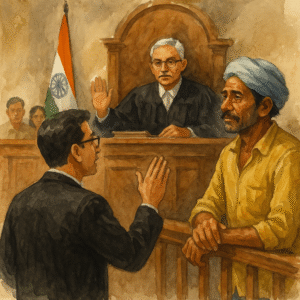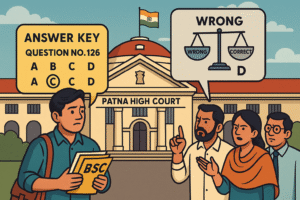Simplified Explanation of the Judgment
The Patna High Court, in a significant judgment delivered on 16 March 2021, ruled that no criminal proceedings can be initiated against public officials without prior government sanction if the alleged acts were performed in the course of their official duties. The ruling came in the case of Criminal Writ Jurisdiction Case No. 454 of 2019, where the petitioner sought quashing of a lower court’s order refusing to direct registration of an FIR against senior government officers, including the Chief Minister, over alleged irregularities in a recruitment examination.
The petitioner, who appeared in person, had alleged that in the 47th Combined Preliminary Examination (2004) conducted by the Bihar Public Service Commission (BPSC), the reservation policy for backward classes under the Bihar Reservation Act, 1991 was violated. He contended that identical cut-off marks were fixed for general and OBC categories, depriving backward-class candidates of their rightful reservation benefits. The petitioner further claimed that when the matter was raised in the Legislative Assembly, the then Chief Minister and senior bureaucrats misled the House by stating that no reservation policy had been breached.
Aggrieved, he filed a criminal complaint in 2015 under various sections of the Indian Penal Code (Sections 166, 167, 420, 467, 468, 120B/34) and Section 12 of the 1991 Reservation Act, seeking investigation against these public officials.
Lower Court Proceedings
The Chief Judicial Magistrate (CJM), Patna, initially directed the police to register an FIR under Section 156(3) of the CrPC. However, the Station House Officer (SHO) of the Sachivalaya Police Station did not register the case and returned the complaint, citing the requirement of prior sanction under Section 197 CrPC, since the accused were public servants acting in their official capacity.
When the petitioner challenged this in a previous writ (Cr.W.J.C. No. 916/2017), the High Court upheld the SHO’s decision, and the Supreme Court later dismissed the petitioner’s appeal (SLP (Crl.) No. 1586/2018).
The petitioner then filed fresh applications before the CJM, insisting that no sanction was required because the alleged acts were not part of the officials’ duties. The CJM rejected his plea on 29 October 2018, holding that the accused acted within the scope of their official duties, and therefore, sanction was mandatory before proceeding further.
Arguments Before the High Court
- The petitioner argued that the Magistrate had wrongly insisted on prior sanction. He relied on Vinubhai Haribhai Malaviya v. State of Gujarat (2019) 17 SCC 1 to contend that sanction is not needed at the pre-investigation stage under Section 156(3) CrPC.
- The Advocate General for the State submitted that the complaint targeted acts performed by public servants — including statements made in the Bihar Legislative Assembly — and hence, were covered under Article 194 (legislative privilege) and Section 197 CrPC. The State argued that the complaint was politically motivated and intended to tarnish reputations.
Court’s Observations
Justice Rajeev Ranjan Prasad, delivering the judgment, conducted a detailed review of precedents from the Supreme Court, including:
- Matajog Dobey v. H.C. Bhari (AIR 1956 SC 44)
- Anil Kumar v. M.K. Aiyappa (2013) 10 SCC 705
- D. Devaraja v. Owais Sabeer Hussain (2020) 7 SCC 695
The Court reiterated that:
- Section 197 CrPC protects public servants from harassment for acts performed “while acting or purporting to act in the discharge of their official duties.”
- There must be a reasonable connection between the act and official duty. Even if the act was excessive or done in bad faith, if it arose out of official functions, prior sanction is mandatory.
- The necessity of sanction may be examined at any stage, but in this case, the CJM correctly concluded that the acts — giving official statements and responses in the Assembly — were within official duties.
Court’s Decision
The Patna High Court upheld the CJM’s order dated 29 October 2018, confirming that:
- The acts alleged were performed in discharge of official functions.
- Therefore, previous sanction from the competent authority under Section 197 CrPC is essential before proceeding.
- The writ petition was dismissed, and the High Court refused to interfere with the lower court’s findings.
Significance or Implication of the Judgment
- Protection for Public Servants:
This judgment reinforces legal protection under Section 197 CrPC, shielding public officials from criminal prosecution for actions undertaken in good faith during their official duties. - Checks Against Frivolous Complaints:
The ruling ensures that politically motivated or personal vendetta-based complaints cannot proceed without prior government approval, thereby preventing harassment of officials. - Accountability Balanced with Protection:
While the decision does not grant immunity for unlawful acts, it maintains that public officers should not face prosecution for official acts without due administrative scrutiny. - Broader Administrative Impact:
The case underscores the importance of judicial restraint when dealing with decisions of constitutional functionaries, particularly those concerning policy or legislative communication.
Legal Issue(s) Decided and Court’s Reasoning
- Issue 1: Whether prior sanction is mandatory before investigating public servants for acts linked to their official duties.
Decision: Yes. Section 197 CrPC requires prior sanction if the alleged offence has a reasonable nexus with official duty. - Issue 2: Can statements made by ministers in the Legislative Assembly form the basis of criminal prosecution?
Decision: No. Such actions are protected under Article 194 of the Constitution, and criminal liability cannot attach to them without due sanction. - Issue 3: Did the Magistrate act within jurisdiction in requiring sanction?
Decision: Yes. The CJM correctly examined the complaint and concluded that sanction was legally necessary before proceeding.
Judgments Relied Upon or Cited by the Court
- Matajog Dobey v. H.C. Bhari, AIR 1956 SC 44
- Anil Kumar & Ors. v. M.K. Aiyappa, (2013) 10 SCC 705
- D. Devaraja v. Owais Sabeer Hussain, (2020) 7 SCC 695
- Vinubhai Haribhai Malaviya v. State of Gujarat, (2019) 17 SCC 1
Case Title
Petitioner v. State of Bihar & Ors.
Case Number
Criminal Writ Jurisdiction Case No. 454 of 2019
(Arising out of Complaint Case No. 3165(C)/2015)
Citation(s)
2021(2) PLJR 481
Coram and Names of Judges
Hon’ble Mr. Justice Rajeev Ranjan Prasad
Names of Advocates and who they appeared for
- Petitioner appeared in person
- Mr. Lalit Kishore, Advocate General, assisted by Mr. Prabhu Narayan Sharma — for the State of Bihar
Link to Judgment
MTYjNDU0IzIwMTkjMSNO-AycWMLxTLbU=
If you found this explanation helpful and wish to stay informed about how legal developments may affect your rights in Bihar, you may consider following Samvida Law Associates for more updates.








